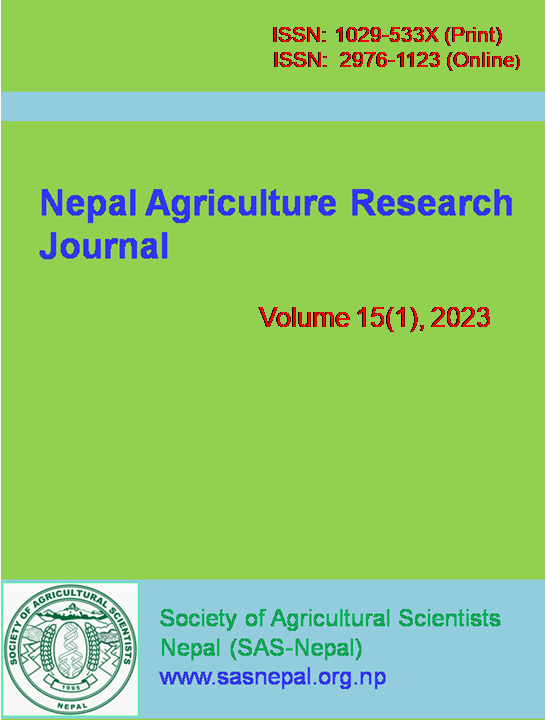Selection of chemical pesticide to minimize toxic effect to ladybird beetle [Coccinella septempunctata Linn (Coleoptera: Coccinellidae)] while managing black bean aphid [Aphis fabae Scop. (Hemiptera: Aphididae)]
DOI:
https://doi.org/10.3126/narj.v15i1.51037Keywords:
Black bean aphid, insecticides, seven spotted ladybird beetleAbstract
Faba bean (Vica faba L.) is important crop of Nepal which is grown in all climatic zone of country. Different insect pests are host of faba bean but black bean aphid Aphis fabae Scop. (Hemiptera: Aphididae) is of more concern. Most of the farmer shifted to another crop due to A. fabae problem. Different insecticide have been sprayed to manage this aphid but most of the farmer were unable control them. However, very limited research were conducted for its ecofriendly management. Thus, we evaluate different insecticides such as nitenpyram, flonicamid, imidacloprid, dimethoate, azadirachtin, and neem oil on laboratory. Scintillating glass vial test and filter paper test were employed. Higher number of aphid mortality were found on dimethoate with LT50 value of 15.93 hour followed by nitenpyram, and imidacloprid with 18.61 and 32.87 hour, respectively on scintillating glass vial test. On filter paper test, LT50 of dimethoate was 27.34 hour followed by imidacloprid and nitenpyram with 49.51 and 53.44, respectively. Similarly, higher lady bird beetle Coccinella septempunctata Linn (Coleoptera: Coccinellidae) mortality were also caused by dimethoate with LT50 value of 63.38 hour followed by imidacloprid and nitenpyram with 153.21 188.42 hour. Our result suggested that nitenpyram or imidacloprid could be used for ecofriendly management of A. fabae with low mortality of its predator C. septempunctata. However precautionary measure has to be taken before applying them and waiting period has to be maintained for harvesting.
Downloads
Downloads
Published
How to Cite
Issue
Section
License
Copyright (c) 2023 Bhusal et al.

This work is licensed under a Creative Commons Attribution-NonCommercial-NoDerivatives 4.0 International License.
This license allows reusers to copy and distribute the material in any medium or format in unadapted form only, for noncommercial purposes only, and only so long as attribution is given to the creator.




